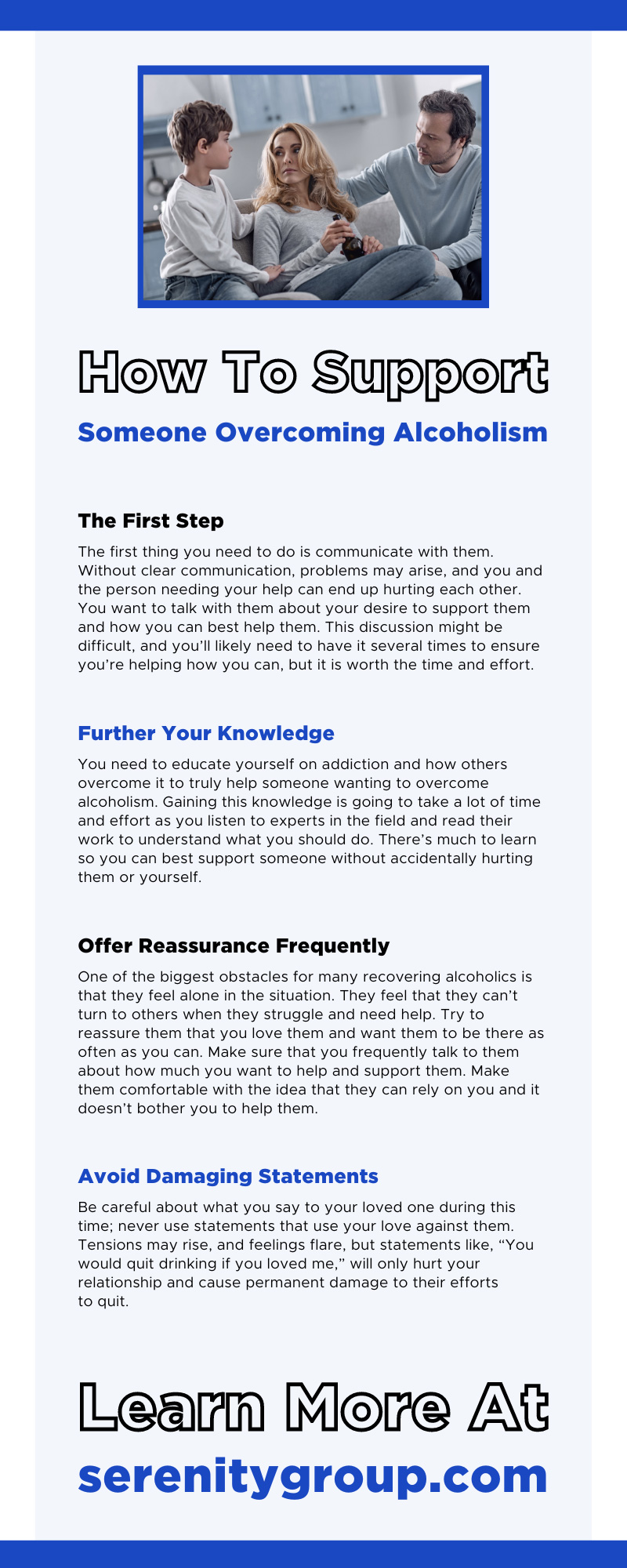How To Support Someone Overcoming Alcoholism

Overcoming a drinking problem is one of the most difficult things someone can do, but a good community and support from others can make it easier. If someone you love wants to overcome alcoholism, here’s how you can support them.
The First Step
The first thing you need to do is communicate with them. Without clear communication, problems may arise, and you and the person needing your help can end up hurting each other. You want to talk with them about your desire to support them and how you can best help them. This discussion might be difficult, and you’ll likely need to have it several times to ensure you’re helping how you can, but it is worth the time and effort.
Further Your Knowledge
You need to educate yourself on addiction and how others overcome it to truly help someone wanting to overcome alcoholism. Gaining this knowledge is going to take a lot of time and effort as you listen to experts in the field and read their work to understand what you should do. There’s much to learn so you can best support someone without accidentally hurting them or yourself.
Seeing Addiction as a Disease
You need to learn that addiction isn’t a moral failing or choice; it’s much more intense and acts like a disease. While the science behind addiction and how it affects people is a newer field, it’s still legitimate. Addiction isn’t a choice or something you can easily stop; it changes your brain chemistry and the way you think. It’s much more like a disease than a conscious decision, which is why you should treat it as such when supporting someone. By framing addiction as a disease, you start tackling the root problems of the condition rather than the symptoms.
It’s Not Personal
Addiction can cause some very intense moments and feelings for the people fighting against it. This internal battle can cause some horrible fights or scary moments when you try to support them through these times. It’s important to remember that they are not intentionally attacking you, but rather their pain and desperation. That doesn’t mean you should just stand there and take it but try to frame it in that light, so you can understand the reasons behind their actions.
Offer Reassurance Frequently
One of the biggest obstacles for many recovering alcoholics is that they feel alone in the situation. They feel that they can’t turn to others when they struggle and need help. Try to reassure them that you love them and want them to be there as often as you can. Make sure that you frequently talk to them about how much you want to help and support them. Make them comfortable with the idea that they can rely on you and it doesn’t bother you to help them.
Avoid Damaging Statements
Be careful about what you say to your loved one during this time; never use statements that use your love against them. Tensions may rise, and feelings flare, but statements like, “You would quit drinking if you loved me,” will only hurt your relationship and cause permanent damage to their efforts to quit. You’ll find greater success by using statements that assure them of your willingness to support them. Insensitive statements, like the example above, can drive you apart and isolate them.
Support Without Enabling
Recovering from something like alcoholism takes a lot of emotional and material support from others, so establishing boundaries is crucial. While this help is necessary, you can go too far and accidentally enable further abuse. Make it clear that you’ll only support them as they strive for health and the betterment of their future. Any more can lead to relapses as they may use the extra support to abuse substances.
Seek Recovery Assistance
One of the hardest parts of recovery is the amount of research it can take to find a good support group or lawyer to help with legal issues. You can help them by taking over this step so they can focus on themselves and their recovery. For example, you can help them find FR-44 insurance quotes in Virginia if they need the FR-44.
Let Them Grow on Their Own
It’s tempting to carve out a clear path in front of someone recovering from alcoholism, but that doesn’t help them build up their own defenses. Encourage them as they grow to be strong enough to reject temptation and make good decisions on their own. You want to shower them with love and support and be there for any mistakes they make. Additionally, ensure you talk to them about their issues with alcoholism, as they need to feel they can talk about it without shame.
Long-Term Support
You need to prepare yourself for the long run when it comes to rehabilitation and recovery. Addiction isn’t something that disappears in one day. It’s going to take many years for them to recover, and it’s possible that the efforts may never cease. Prepare to support your loved one for the long term.
Encourage Community-Building
You can’t support someone by yourself; it’s just not possible to be available at all times, which is where community-building comes in. Try to help them create a community and engage with others who can offer support just as you do. Groups like Alcoholics Anonymous are vital, as they can support your loved one through the tough times when you feel burnt out.
Prioritize Yourself
You also need support when helping someone overcome alcoholism. You won’t do anyone any favors if you hurt yourself when helping a loved one. They’ll feel bad for using you, and you’ll run yourself ragged. Find a community for yourself that focuses on empowering you to help someone who’s recovering from alcoholism.
Recovering from alcoholism is a noble and difficult task and isn’t something one should do alone if possible. Learning how to best support your loved one and being someone they can rely on while minimizing pain and hurt for you both can be challenging. However, you do not have to do it alone. Refer to our guide often, and seek the resources you both need to ensure a healthy path forward.


Recent Comments